Reports Detail Abuse of Detained Women's Rights Activists In Iran

Women's rights activists imprisoned in Gilan province in northern Iran have been subjected to severe beatings and mental abuse, Iran International can reveal.

Women's rights activists imprisoned in Gilan province in northern Iran have been subjected to severe beatings and mental abuse, Iran International can reveal.
According to information obtained by Iran International, Sara Jahani, a doctor at a hospital in Rasht, refused to share her phone's passcode with authorities and was beaten for this resistance.
Meanwhile, in the Ministry of Intelligence's detention center, Hooman Taheri, a Gilan-based activist, also suffered repeated severe assaults. Days after being transferred to the public ward, he still bears visible signs of a broken tooth, extensive facial swelling, and bruises on his neck and body.
It has been reported that some detainees have been denied communication privileges and visitation rights to prevent the disclosure of abuse.
Last Thursday, the Islamic Republic's security forces arrested several women's rights activists in the cities of Rasht, Fooman, Anzali, and Lahijan.
Condemning these detentions, hundreds of activists have called for their immediate release.
As the anniversary of Mahsa Amini's death at the hands of the hijab police approaches, the government's efforts to suppress activists, students, and teachers have escalated. Security agencies have recently been summoning and issuing threats over the phone to dozens of students across Iranian universities.
Various reports also highlight security pressure on families of those killed in the uprising, aiming to prevent gatherings on the anniversary of their children's deaths as well as desecration of victims’ graves.

Iran’s regime has always pressured female athletes to abide by strict hijab rules during international games, but many are now refusing to obey despite repercussions.
Just last week, members of Iran's national women's muay thai team boldly challenged the regulations by competing unveiled at the Asian Championships held in Tashkent, Uzbekistan's capital.
This courageous act has triggered an outcry among hardliners, with some officials even disputing the team's official representation of the Islamic Republic. Others are calling on the Ministry of Sports to take decisive action to quell such open defiance.
The government has proposed a bill that, if approved, will impose heavy fines and other punishments on celebrities including athletes who appear unveiled in public.
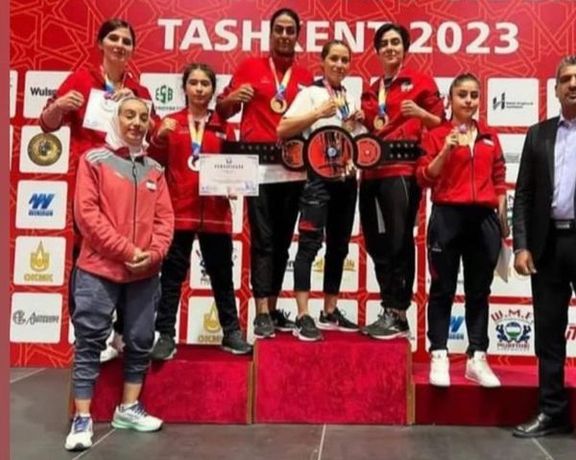
Over the past few years, several female athletes have chosen to compete unveiled at international events, seeking asylum abroad to avoid being compelled to return to Iran and face punishment. Notably, 19-year-old Dorsa Derakhshani, an International Master and Woman Grandmaster since 2016, was barred from the national team after refusing to wear a headscarf at the 2017 Gibraltar Chess Festival. She was then a temporary resident of Spain.
"Minutes before a match the deputy chairman of the federation would constantly whisper in my ear to be careful not to let my head cover to drop," Parisa Jahanfekrian, former weightlifting champion who is now living in Germany, told Iran International. Once in very warm weather he told me at least ten times to tuck my hair under my head cover only two minutes before the match.
"There, I was constantly thinking about the consequences if my head cover slipped back instead of thinking how to hold the halter and how to carryout my technic," she said.
It was agonizing to conform with all the dos and don'ts that were imposed on female athletes, Jahanfekrian told Iran International, adding that there would always be meetings before international competitions about hijab.
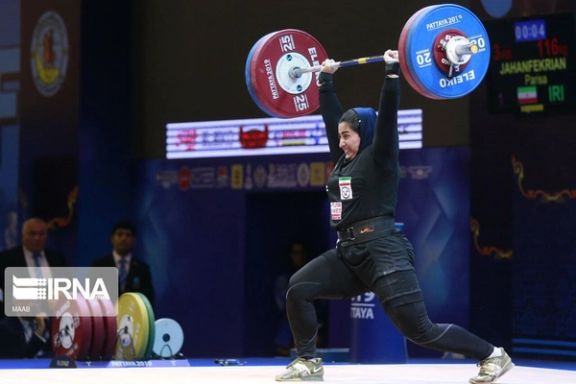
"They demanded that we always was wore a long tunic (called maanto in Iran) and a pullover headscarf with stitched front (called Maghna'e in Iran) when we left our rooms during our stay abroad.
Female athletes who defy hijab rules receive substantial support and are often hailed as heroes by the public. However, they also endure significant pressure from the authorities.
During the anti-government protests of the previous year, climber Elnaz Rekabi made a bold statement by discarding her hijab during the finals of a competition in South Korea, as an act of solidarity with the Woman, Life, Freedom protesters. She received a warm welcome upon her return to Iran after the competition.
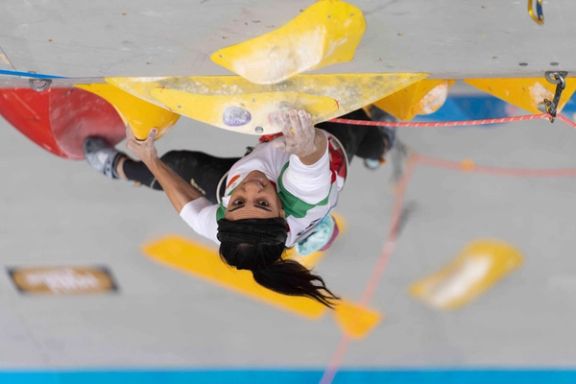
Soon after, state media released a video interview with her at the airport arrival hall. In the interview, she referred to her decision to appear without a hijab as "inadvertent." Many speculated that her statements were made under the pressure of regime agents. Social media users criticized the regime's attempts to undermine her convictions, noting that their efforts had ultimately failed.
People on social media said the regime had tried “to break this brave woman,” force her to repudiate her own convictions, and discredit her among hundreds of thousands of young girls who admired her “but as always, they failed.”
The regime has since then been faced with the dilemma of whether to allow women's participation at international competitions and ignore their defiance or keep them home.
The rule is that arms must be always covered to the wrist and legs to the ankle. Roya Mahboodi, an Asian Women’s Arm-Wrestling champion told Etemad daily in June that a government official banned the sport for some period of time because the wrist and a part of the elbow could be seen during matches.
She recounted how wearing a shaal (normal rectangular scarf), which lets more hair to cascade around the face and in the back, was banned whereas maghna'e tightly frames the face and comes down to the chest. Shaal has been the head cover of choice for many Iranian women who do not believe in wearing hijab but have to abide by the hijab rules.

PEN America, an organization that defends writers, journalists and protects freedom of artistic expression, has condemned the arrest of Iranian musician Mehdi Yarrahi.
In a statement released online, the organization called for Yarrahi’s immediate release and for all charges to be dropped against him.
Yarrahi was arrested after the release of his song ‘Your Headscarf’, a poignant critique of Iran's enduring mandatory hijab policy.
Simultaneously, the Iranian government announced a ban on "cultural activists" who they considered to be “acting against the nation's interests” including female artists and actors who remove their hijabs.
“These bans carried out against cultural activists serve as a grim reminder of the Iranian government’s continued campaign to suppress any artistic expression that dares to challenge the status quo.
The legal action taken against Mehdi Yarrahi is indicative of the Iranian regime’s systematic, brutal repression of democratic free expression. We stand in solidarity with Iran’s artists and cultural workers defending fundamental rights and freedoms, and demand that all charges against Yarrahi be dropped,” said Julie Trebault, director of Artists at Risk Connection.
Yarrahi's arrest is the latest development in a series of repressive measures imposed by the Iranian government, coinciding with the approaching one-year anniversary of the death of Amini, in police custody following her arrest for not wearing the mandatory headscarf.
Earlier this month, Iranian filmmaker Saeed Roustayi was sentenced to six months in prison for screening his award-winning film Leila’s Brothers at the Cannes Film Festival. Other prominent figures such as political rapper Toomaj Salehi and actress Taraneh Alidoosti have also faced persecution for their involvement in the September 2022 protests.
PEN America’s latest Freedom to Write Index — an annual count of writers in prison worldwide — found that Iran is the largest jailer of women writers globally.
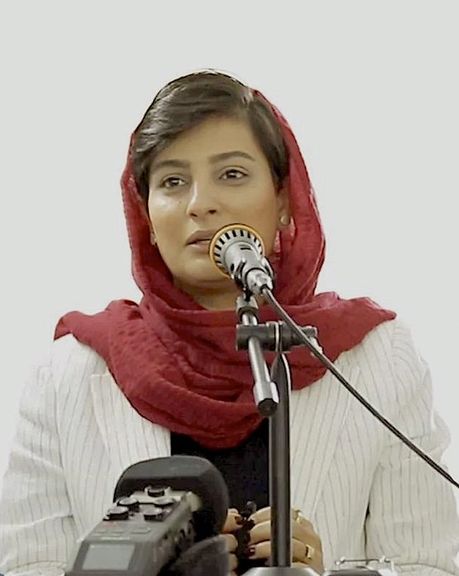
The husband of a female political prisoner in Evin Prison has revealed that his wife is being denied emergency medical treatment despite ongoing pressure from hospitals.
Saeed Parsaie, the husband of Elaheh Mohammadi, has reported that despite the insistence of the Evin Prison physician to conduct emergency tests over the past two months, she is yet to receive medical attention.
"It's been nearly two months since the Evin Prison physician registered Elaheh for an emergency ultrasound. During this time, despite five family-hospital coordination efforts, the doctor refrained from examining Elaheh,” Parsaie wrote on his social media accounts.
Mohammadi, a journalist who was one of the first to report the death in custody of Mahsa Amini in September 2022 was arrested and jailed along with Niloufar Hamedi. The pair, who worked for the reformist Iranian newspapers Shargh and Ham-Mihan, were detained for 300 days because the regime held them responsible for the nationwide protests that erupted after Amini’s death.
Last week, the Workers' Syndicate of Tehran and Suburbs Bus Company reported that Reza Shahabi, a labor activist imprisoned in Evin, has also been deprived of medical treatment. According to the report, Shahabi's medical case was referred to the medical commission and his treating physician emphasized that he "definitely needs surgery."
Several other female prisoners who have been released from Evin have spoken out about the mistreatment by prison authorities and said they had also faced health issues and were denied access to medical facilities. They also complained about being deprived of contacting their families
Parsaie also referred to this in his social media posts, saying that the women's ward telephone in Evin Prison was disconnected during the weekends. He said that there are only three telephone lines for over 40 women in the women's ward of Evin Prison, all of which are of poor quality. This is just another way that the regime chooses to harass and mistreat political prisoners in Iran.
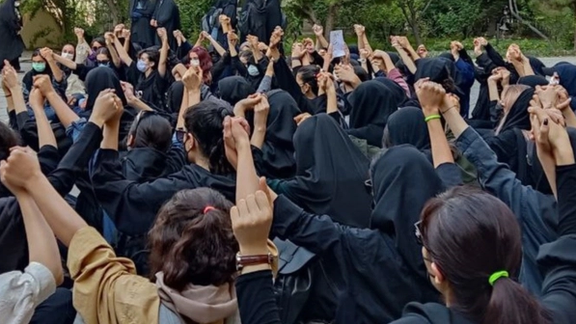
In the midst of an ongoing debate over the expulsion of university professors, student unions across Iran have voiced their protest against gender segregation in classrooms.
Iran's Student Union Council issued a statement on Monday, in response to a letter signed by Abolfazl Ghafari, the Deputy for Cultural, Social, and Student Affairs at Ferdowsi University in Mashhad advocating for the introduction of gender segregation.
The memo has also been shared with the heads of other faculties within the institution, signaling a broader institutional shift towards segregation. The students’ statement underscored the divisive nature of gender separation and rallied against it.
The discourse on gender segregation in Iranian universities is not new, having spanned several decades and permeated various aspects of campus life, including dormitories, library halls, and sports facilities. Furthermore, many single-gender universities have been established in recent years.
While Supreme Leader Ali Khamenei expressed opposition to physically partitioning classrooms in the late 1990s, he has more recently advocated for the Islamization of universities and the avoidance of mixed-gender interactions.
As the anniversary of last year’s protests approaches and nationwide demonstrations loom, the government has formally launched the implementation of gender segregation within university classrooms.
Simultaneously, the expulsion of professors, summoning of students, and issuance of suspension and expulsion orders across various universities continues. Some protesting students remain under arrest and trial, further deepening the tensions in the field of higher education.
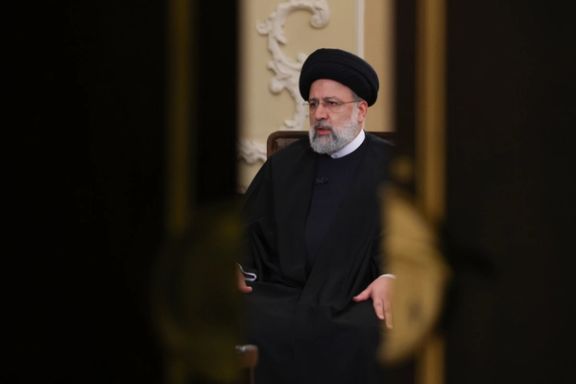
Iran's Minister of Culture has praised President Raisi’s character as a trusted leader of the Islamic Republic, saying he has been “tested across various critical junctures.”
Mohammad-Mehdi Esmaeili, speaking in support of the president, also highlighted that during his youth, Raisi was entrusted with numerous judicial missions by the late Ruhollah Khomeini, the founding leader of the Islamic Republic.
President Raisi is facing domestic and international scrutiny due to his alleged involvement in orchestrating mass prison executions in 1988. Many of these executions targeted individuals associated with opposition groups such as the Mujahedin-e Khalq Organization (MEK), as well as leftist, secular, and Kurdish organizations.
Raisi was a member of an ad hoc judicial committee colloquially known as the "Death Commission." This committee was responsible for deciding the fates of prisoners during summary trials that were held in secret. While Raisi has denied direct involvement in issuing sentences, he has defended the actions against the MEK, citing their history of “violence” as justification.
Notably, some prisoners had been previously released from incarceration, only to be rearrested and retried during the execution spree, which was also referred to as a prison purge. The intention behind these retrials was to ensure prisoners fully denounced the MEK and demonstrated repentance.
The precise number of prisoners executed during the 1988 purges remains uncertain. However, according to Amnesty International, the Iranian authorities "forcibly disappeared" and "extrajudicially executed" an estimated 5,000 individuals between July and September 1988.






